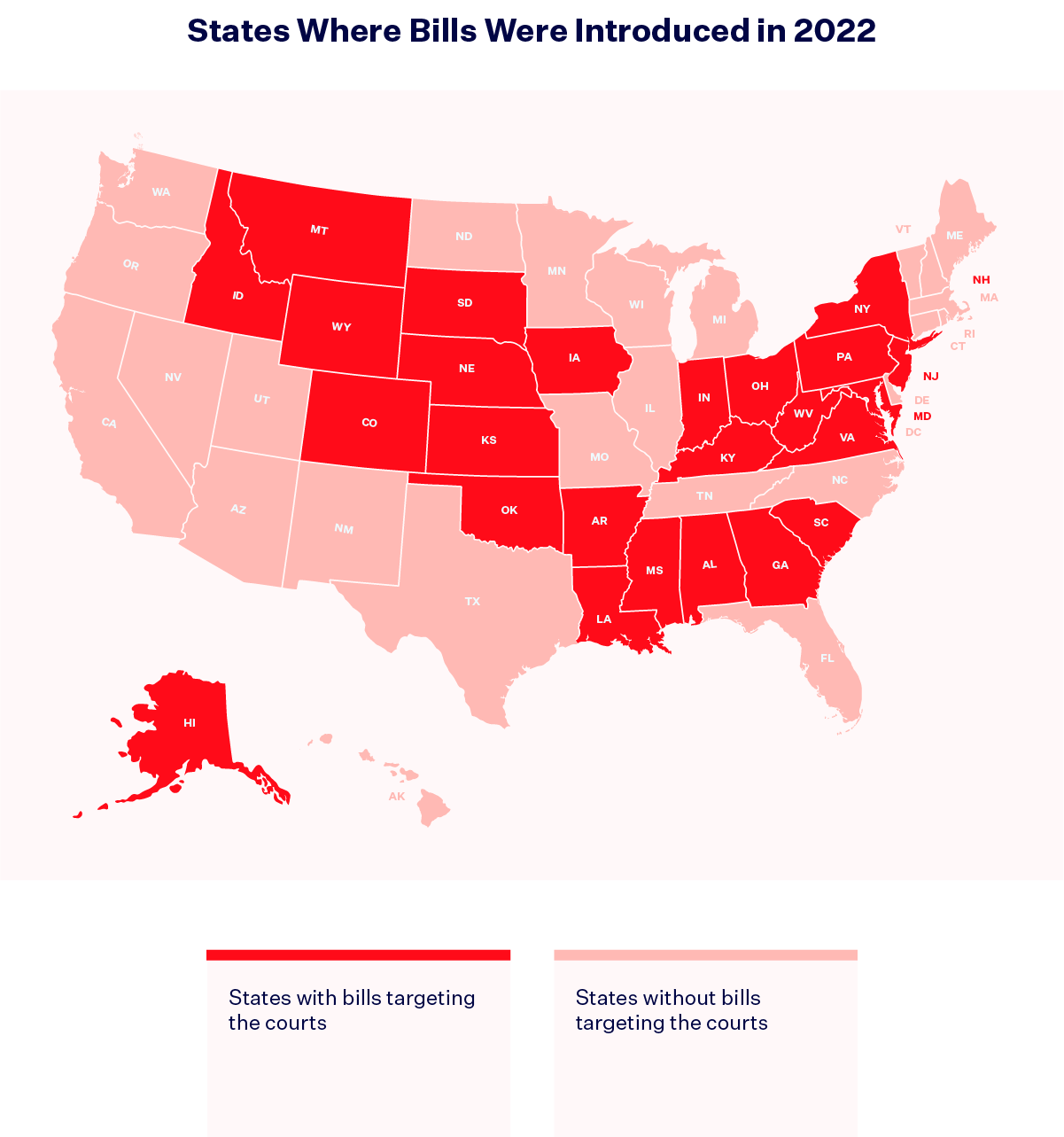These Bills Aim To Curb the Power of the Courts

In 2022, states have continued to consider new laws that would limit voting or undermine democracy. But another trend that shouldn’t be overlooked is a growing number of proposed laws that directly target the judicial system. In many states, when thwarted by the courts from enacting the legislation they want, lawmakers are attacking the courts instead. The Brennan Center recently surveyed all the proposed laws this year that would undermine the role and independence of courts. In its report titled “Legislative Assaults on State Courts — 2022,” the Brennan Center breaks down the kinds of laws that states are considering and where they are in the legislative process. In today’s Data Dive, we walk you through the report and highlight a few examples.
Twenty-five states have considered bills that target both federal and state courts.

As of June 2022, 73 bills that would undermine the role and independence of state courts have been introduced in 25 states. Four have been signed into law in three states, while 22 others have advanced in some significant way, such as passing out of a legislative committee, receiving a favorable hearing or passing one house of the state legislature. These proposed laws all target different aspects of the judicial system, but share the goal of undermining the independence of courts.
Here are the types of bills legislators are considering:
1. Bills that restrict enforcement of court decisions.
By far the most common type of bill would either enable state officials to override court decisions or prohibit state officials from enforcing them. In the wake of Dobbs v. Jackson Women’s Health Organization, many of these bills would limit enforcement of court decisions recognizing a right to abortion, such as a bill in Kansas that would deem any state or federal court decisions protecting abortion rights as “void” and unenforcable. In Oklahoma, two recently-enacted bills, which were modeled after Texas’s Senate Bill 8, would ban abortion while using an enforcement scheme to avoid judicial review. Other states introduced bills that would restrict enforcement of decisions related to guns, including a bill that was signed into law in Wyoming. A few states are targeting enforcement of decisions more generally. One bill, Iowa’s House File 2423, would have allowed the state legislature to nullify presidential executive orders and federal court decisions by a majority vote — a bill that likely would have led to a collision between state law and the federal constitution’s supremacy clause that places federal law above state law.
2. Bills that interfere with judicial decision-making.
Six states considered bills that would interfere with how judges make decisions or make it easier to target judges for unpopular decisions. A bill in Kentucky, which ultimately failed to advance in the legislative process, would have prohibited the state government, including state courts, from taking any action against a person or religious organization who discriminated against an LGBT individual in the name of religious freedom. Others directly target judges for their decisions — a proposed constitutional amendment in New Hampshire would have allowed voters to recall and remove state court judges via petition.
3. Bills that reduce court resources in retaliation for unfavorable decisions.
Ohio Republicans introduced a bill that would cut the state Supreme Court’s budget. The bill was introduced after the court’s series of decisions against gerrymandered legislative districts forced the state to hold two separate primaries this year. Rather than abide by the court’s decisions, Ohio Republicans seem more interested in retaliation — some have also called for impeachment of the court’s Republican chief justice.
4. Bills that let partisans pick friendly judges to hear their cases.
Judge-shopping is a common practice when plaintiffs try to file lawsuits in venues where they’re more likely to get favorable judges. Alabama considered a bill this year that would do something similar, changing how cases are assigned in state court to stymie challenges to the redistricting process. Right now, such lawsuits must be filed in a court where the majority of judges are Democrats. The bill Alabama considered would have changed this, making it more likely Republicans would hear any challenges to redistricting in the state. While the bill made it out of committee, it failed to pass either chamber of the legislature this year.
5. Bills that gerrymander state court elections.
In Montana, the legislature referred a statute to the 2022 ballot that would gerrymander the state’s Supreme Court in response to unfavorable rulings for Republicans. Right now, Montana’s Supreme Court justices are elected statewide. The statute would instead have justices elected from districts — opening the door for judicial gerrymandering and other political shenanigans. While the referendum is currently tied up in litigation, it could still end up on this year’s ballot.
6. Bills that change how judges are selected.
Finally, several states considered changes to how judges are selected in order to make the process more partisan. States use a variety of methods beyond appointment to choose their judges, often employing nonpartisan commissions to choose nominees or holding nonpartisan judicial elections. Many of these bills weaken nominating commissions or give politicians more control over the selection process, like three separate bills in Idaho, which would give the governor more control over the nominating commission. Another bill giving the governor more power to select judges was signed into law in Iowa.
Courts help protect us from bad laws, but bills jeopardize that role.
The courts, especially state courts, serve as an important check when legislatures and politicians run amok. Already this year, state courts have overturned extreme partisan gerrymanders and ruled against restrictive voting laws. Other state courts have blocked abortion bans from going into effect in the wake of Dobbs. All of these bills are intended to make it harder for courts to take those very steps. Rather than comply with the rule of law, Republicans are trying to manipulate the courts instead when they can’t get what they want. For a party that seeks to gain legislative power by gerrymandering legislative districts, we shouldn’t be surprised they want to manipulate the courts in the same way.